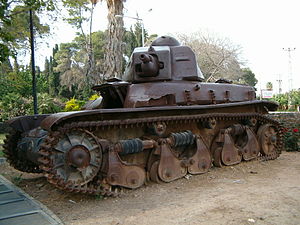Battles of the Kinarot Valley
| Battles of the Kinarot Valley | |||||||
|---|---|---|---|---|---|---|---|
| Part of the 1948 Arab–Israeli War | |||||||
 Preserved Renault R35 tank destroyed by Israel at Degania. The PIAT's hit can be seen at the top of the turret. |
|||||||
|
|||||||
| Belligerents | |||||||
|
|
|
||||||
| Commanders and leaders | |||||||
|
|
|
||||||
| Strength | |||||||
|
~70 (Degania Alef) |
Infantry brigade, Tank battalion, Two armored vehicle battalions, Artillery battalion |
||||||
| Casualties and losses | |||||||
| 8 (Degania Alef) 54 (Tzemah) |
45 (Israeli estimate) | ||||||
~70 (Degania Alef)
The Battles of the Kinarot Valley (Hebrew: הַמַּעֲרָכָה בְּבִקְעַת כִּנָּרוֹת, HaMa'arakha BeBik'at Kinarot), is a collective name for a series of military engagements between the Haganah and the Syrian army during the 1948 Arab–Israeli War, fought between May 15–22, 1948 in the Kinarot Valley. It includes two main sites: the Battle of Degania–Samakh (Tzemah), and battles near Masada–Sha'ar HaGolan. The engagements were part of the battles of the Jordan Valley, which also saw fighting against Transjordan in the area of Gesher.
The battles began shortly after the Israeli declaration of independence, when Syria shelled Ein Gev on the night of May 15–16. They were the first military engagement between Israel and Syria. On May 18, Syria attacked the Israeli forward position in Samakh (Tzemah), and on May 20 attacked Degania Alef and occupied Masada and Sha'ar HaGolan. The attack on Degania Alef was a failure, after which the Syrian forces attempted to capture Degania Bet. After reaching a stalemate, they retreated to their initial position in Tel al-Qasr, where they remained until the end of the war.
The campaign was perceived as a decisive Israeli victory, causing reorganizations in the Syrian high command and the birth of heroic tales in Israel. However, Syria made a small territorial gain and certain actions were criticized within Israel, such as the retreat from Masada and Sha'ar HaGolan.
...
Wikipedia
